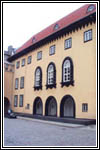 |
Vol 1, No 13
20 September 1999 |
|
|
 T H E A M B E R C O A S T:
T H E A M B E R C O A S T:
Running toward Helsinki Mel Huang Through its public goodwill gestures toward its southern neighbours, Estonia may have jeopardised its own coveted position as a front-runner for membership in the European Union. When German Foreign Minister Joschka Fischer recently crossed the Estonian-Finnish border, he delivered a message that confirmed both the success of and the fears about this diplomatic move: Germany would like to "even the field" for all EU candidate countries. Since Estonia's position in the group of front-runners was all but assured after the European Commission announced the candidates several years ago, Estonia has been vocal in its support for Latvia and Lithuania to join the coveted group. Even members within the Estonian Foreign Ministry usually against Baltic co-operation chose a conciliatory tone and called on Brussels to enlarge the "5+1" group to include Estonia's Baltic brethren. At times, it seemed like a necessary show of solidarity in public, even though under the covers people were less-than-convinced. Nevertheless, statements made by Estonian politicians abroad sent a clear message of at least public support for Latvia and Lithuania's EU bid. At the same time, Estonia kept its eye on its coveted position in the front-running group. Negotiations towards all relevant aspects of EU membership have proceeded with the "5+1" group, albeit at a snail's pace. Though many of the most difficult chapters of the negotiations, for instance agriculture, have yet to be opened, being in the front-running group has immense symbolic value. One particular illustration of this is the fact that George Soros-funded foundations have been cutting back their activities in countries of the front-running group. It also seems that since it is the least well-known member of the "5+1" group - a fact which sometimes leads to complaints about the lack of adequate coverage - Estonia has managed to avoid the harsh criticism that has befallen some of the other members. Poland's large size and agricultural and mining sectors worry many in Brussels, while the Czech downward spiral continues to damage that country's bid. Even tiny Slovenia has taken more attacks in the media than Estonia. Some argue that the reason for this is that what is happening between Brussels and Tallinn is not "negotiation" per se but rather that the Estonian negotiators have been capitulating on each dispute. At the same time, following the Balkan crises, the EU is engaged in a thorough review of its enlargement strategy. While Estonia has enjoyed its privileged status as a part of the "5+1," Romania and others are waiting impatiently for their own inclusion. The symbolic value of being a "front-runner" is significant not only for national spirit and for political point-scoring but also in terms of tangible assistance and international recognition. With talk running as wild as the bombs during the Kosova campaign, the EU has been forced into a corner regarding what to do to placate the South-East. Some argue that the negotiations have been so slow that the promotion of other countries into the front-running group would do no harm. However, many analysts think that a promotion of one or all the new potential candidate countries would inevitably slow down the general pace of negotiations and drag the entire process down. It is also difficult to proceed in set negotiations when a member country could effectively veto the membership possibilities of others. There are three examples of this, the first being Turkey. Though the earthquake in Turkey (and, later, its sad repetition in Greece) has brought its old enemyGreece closer than at any time in recent memory, it is still unlikely to carry through to full EU membership in the conceivable future. Warm relations brought on by tragedy do not last forever, and the first swing towards disagreement would no doubt reopen old wounds. With Greek European Minister Yiannos Kranidiotis dying in an accident in the skies over Romania last week, one of the driving forces for reconciliation with Turkey is now gone. Then, there is the German question: would Germany tolerate the instant equalisation of all its Gastarbeiter that would come with Turkey's full EU membership? This brings us to the second problem country, Cyprus: it remains divided, and its fate hinges on Greek-Turkish relations as much as Greek-Turkish relations hinge on it. Sooner or later, if the EU proceeds on its present course, the issue of the island's unrecognised split will exacerbate tensions that would in turn affect previous problems between Greece and Turkey. The third example is the anti-nuclear crusade of Austria, which is publicly using the word "veto" in certain cases. One candidate country, the Czech Republic, has already proven problematic in this regard, but the addition of Slovakia, Lithuania and Bulgaria would seriously complicate the issue and push Vienna into deeper turmoil. Vienna's "green fingers" could seriously jeopardise the chances of several governments to get into the EU or even to gain voter support (see Amber Coast from 23 August 1999). With all this in mind, Estonia should certainly fear the "levelling" of the playing field. Though publicly, it has no choice but to support its Baltic neighbours, Estonia realises that the goal of EU membership could be pushed back yet again. However, if new European Commission President Romano Prodi's calls for a timetable on bringing in the front-runners are heeded, it could mean Estonia's salvation from its promissory anchors. Mel Huang, 16 September 1999
|
|
![]()
Copyright (c) 1999 - Central Europe Review and Internet servis, a.s.
All Rights
Reserved